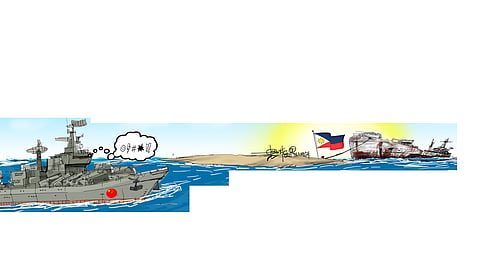
- NEWS
- the EDIT
- COMMENTARY
- BUSINESS
- LIFE
- SHOW
- ACTION
- GLOBAL GOALS
- SNAPS
- DYARYO TIRADA
- MORE

In 1991, the Senate, in a landmark move, evicted US military installations from the country by terminating the 1947 Military Bases Agreement.
The deal between the United States and the Philippines had provided that American forces could maintain areas in the country for military use until 2046 but a series of events that started with the 1991 rescinding of the agreement and the subsequent eruption of Mt. Pinatubo convinced the US to abandon its Philippine bases.
Aborting the military deal with the US was an offshoot of the abuses committed on Filipinos by the foreign forces where Filipinos were prevented from even setting foot on American grounds.
The nation endured and prevailed over the foreign power but now a different foreign force employing similar methods to clip the rights of Filipinos has emerged as a threat.
Thus, the journey of the country toward a credible defense force begins.
The country again needs to assert itself against an external aggressor, which is what is behind the persistence of the Philippine Navy resupply missions to the country’s outposts in the West Philippine Sea without having to seek permission from a foreign entity.
Defending Philippine territory is a reprise of an old struggle against a dominant force.
“Our operations are conducted within our territorial waters and exclusive economic zone, and we will not be deterred by foreign interference or intimidation,” stressed National Security Adviser (NSA) Secretary Eduardo Año.
The NSA finds it unacceptable that Filipinos must seek permission from another entity to perform an undertaking in its own territory.
Amid the flurry of intimidation through the use of water cannons and the ramming of boats, China suggested that Manila must first notify Beijing before accessing areas that fall within the Philippines’ exclusive economic zone.
China’s foreign ministry said it would allow the Philippines to deliver supplies and evacuate personnel if it notifies Beijing in advance.
The deadlock has no foreseeable solution since China insists on ramming its nine-dash line territorial claim down the throats of other nations.
The National Security Council, which advises the President, said the government is open to dialogue and negotiation to resolve disputes but on an equal footing, which means respecting international conventions, including the 2016 arbitral ruling.
The Permanent Court of Arbitration, backed by the United Nations, invalidated the nine-dash line claim of China ruling that it was without basis.
The arbitration body instead urged nations to follow the provisions of the United Nations Convention on the Law of the Sea that specify the entitlement of nations in the maritime expanse.
Beijing also recently protested the incorporation of American forces in military bases facing Taiwan in the northern Philippines under the expanded Enhanced Defense Cooperation Agreement with the US, which is unreasonable as it is an alien intrusion into an agreement the country has with an ally.
Recently, the Armed Forces of the Philippines (AFP) established a military base in the Batanes Islands without the involvement of the United States which China would have likely countered.
The new port is being built for nonmilitary intentions — it aims to help unload cargo from Manila during the monsoon season.
Beijing remains suspicious the new project has the backing of the US in its aim to prepare for a possible conflict involving Taiwan.
The Chinese embassy said Taiwan is an “internal matter” that should never develop into an issue with the Philippines.
The AFP showed its capability to build a port without American help, which is part of the ultimate objective of a self-sustaining security force that is not dictated or dependent on a super military power.
Filipinos have proven themselves reliable partners of other nations but they will never compromise their self-determination.
